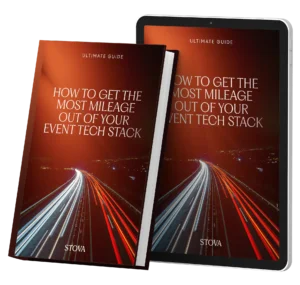Successful Event Planning Tips, Part 1: Pre-Planning
October 2, 2018
This article is part one of a series breaking down useful tips for how to plan a conference event, from pre-planning to building a registration page and nailing the day-of experience.
As you begin your planning process – whether you get started 6-12 months beforehand or if as little as 90 days will do the trick. – these 6 event management tips will help you conquer the pre-planning phase and set yourself up for success.
1. Determine your event goals
Before anything else, sit down with a blank sheet of paper and outline your goals. What you write down will help clarify everything else you do in the process. Understanding the history of previous events is helpful at this stage. Here are a few questions to get you started:
♦ Who is your audience? What’s important to them?
♦ Why should your attendees make the trip? How can you deliver a valuable experience?
♦ How many guests do you want to attend?
♦ Is your audience budget conscious?
♦ How will you (and your boss) measure success and quantify ROI?
2. Determine your key stakeholders
Who are the key players? These could be internal, including your team and your leadership, or external, e.g. your client, sponsors, and vendors. What are they investing and what do they expect in terms of ROI? Have these conversations with individual stakeholders and make sure you manage expectations up front.
3. Outline a rough budget
As a starting point, reference figures from similar/past events and make educated guesses for any unknowns. Consider stakeholder investment and expectations as mentioned above. Are there any areas you can cut costs or keep costs to a minimum? Are there areas where you know you need to invest additional resources? Reviewing previous event surveys could provide great guidance here around areas that could use improvements.
4. Draft a schedule
When it comes to planning a conference timeline, consider what you (and your stakeholders) need to cover when it comes to content, speakers and sessions. These specifics will help you understand how many hours or days you’ll need. Once you’ve determined length, look to your calendar for a few date options. Make sure you communicate the options to your stakeholders and get feedback as soon as you can – schedules fill up quickly.
Again, previous event surveys may give you some helpful hints, especially around whether attendees were over- or under- programmed in the past. This may suggest you schedule more breaks, that additional networking time could be helpful, or perhaps additional breakout sessions are needed.
5. Scout locations and venues
Which region is best for you and your attendees? Keep cost of travel and local vendor accommodations in mind. We suggest narrowing your city choices down to three. Then, decide if you prefer to select a venue or if a third party can help with this process.
In any case, keep in mind the infrastructure and functionality of each venue you look into. Will you need to offer Wi-Fi, and will the network comfortably hold your targeted number of attendees?
Hotels are always popular venue choices, but utilizing unique spaces is a trending alternative. Our friends at Headbox.com have great ideas for unusual spaces. Their work is specific to London, however, we suggest checking out their site to get the gears turning.
Convention and Visitors Bureaus (CVB) are another great resource for help not just with hotels, but for suggestions around local area information as well. Connect with the local CVB to gather helpful information on working in their area.
6. Put together a marketing plan
Your event is one of a kind! So how will you spread the word and build momentum?
A recent survey conducted by the Event Manager Blog found that 73% of event planners believe social media is the most effective tool for marketing events. Check out our list of specific ways to use social media to promote your event.
In addition to social media, outline email marketing and paid advertising campaigns. Email marketing is still consistently effective – 65% of planners list it as one of their primary channels, while 50% of planners use paid advertising to promote events.
Remember: in this day and age, people love videos. A recap video of last year’s event or a video revealing guest speakers are fantastic ways to demonstrate what’s to come and generate buzz.
Follow these six tips for planning an event and your pre-planning process will be in solid shape. If you’re looking for more corporate event planning tips, check back on the blog for additional suggestions on building a registration page and nailing the day-of experience.
Whether your event is virtual, hybrid, or in-person, enhance your attendee’s journey with an event ecosystem built for your audience. Ready to walk through Stova's event technology solutions? Schedule some time with us today.


